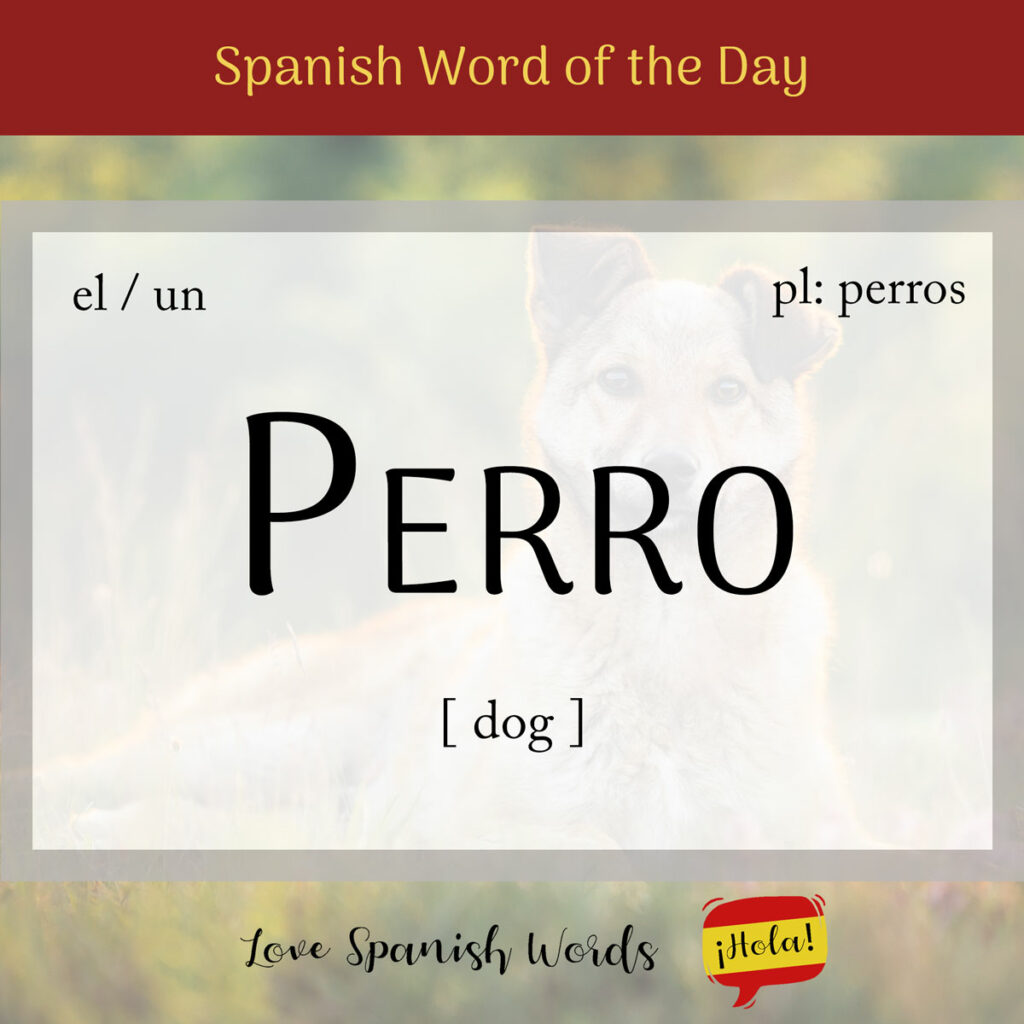When we are talking about man’s best friend the dog we most commonly use the noun perro. The origins of this word are under much debate as it cannot be compared to the word for dog in any of the languages close to Spanish or Castellano. In old Spanish the word for dog was cán from the Latin canis.
One of the theories behind the origins of the word perro is that it is an onomatopoeia and derives from the sound the animal makes when it growls (perr perr). Another theory is that it derives from the Greek word for fire πῦρ (pyr) in reference to the animal’s fiery nature. (Source: Diccionario de la Real Academia Española de la Lengua – DRAE)
Latin American Pronunciation
European Spanish Pronunciation

Being a common noun perro has both masculine and feminine forms depending on whether you are talking about a male (macho) dog or a female (hembra) dog. Below are the definite and indefinite articles used:
Masculine
- el perro = the dog
- los perros = the dogs
- un perro = a dog
- unos perros = some dogs
Feminine
- la perra = the dog
- las perras = the dogs
- una perra = a dog
- unas perras = some dogs
Paseo al perro dos veces al día.
I walk the dog twice a day.
As well as coming in many breeds, shapes and sizes dogs play a large part in the lives of humans. Below is a list of some of the roles or ‘jobs’ that dogs have in society.
- perro de mascota/compañía = pet dog/companion
- perro guardián = guard dog
- perro policía = police dog
- perro de salvamento = rescue dog
- perro pastor = sheep dog
- perro guía = guide dog
Su perro mascota era tan fiel.
Her pet dog was so faithful.
El perro pastor está muy bien entrenado.
The sheep dog is so well trained.

The noun perro can also be used in the context of describing an unlikeable or unpleasant person that deserves disdain or contempt and also to describe a womaniser or promiscuous male. The noun perra can similarly mean a prostitute or ‘easy’ woman or lowlife.
Todos sus exnovios eran perros de verdad.
All of her ex-boyfriends were total pigs.
Perra can also become an adjective used colloquially to describe something particularly bad luck or tough.
He pasado una temporada perra.
I’ve been through a rough patch.
The diminutive perrito is a term of endearment used towards a pet dog which means literally little dog, and interestingly it also becomes the tasty snack perrito caliente (hot dog).

Important: In Mexico, as well as having the same meanings as the noun and adjective, perro also has many other meanings both as an adjective and verb. For example:
- Difficult: ¡Estuvo súper perro el examen! = This exam was really difficult!
- Awesome: ¡El nuevo disco de Manu Chao esta bien perro! = The new Manu Chao album is awesome!
- Ambitious (in a career-like context): Este guey es bien perro! = This dude is a go getter!
- To dance to reggaetón music in a provocative way: ¡Vamos a perrear! = Let’s go dance reggaetón!

Idiomatic expressions featuring ‘perro’
Estaba de un humor de perros
English meaning: He was in a foul mood
Literal translation: He was in a mood of dogs
Perro ladrador, poco mordedor / Perro que ladra no muerde
English meaning: His bark is worse than his bite / he’s harmless
Literal translation: A dog that barks a lot will bite little / A dog that barks doesn’t bite
Heder a perro muerto
English meaning: To stink to high heaven
Literal translation: To stink like a dead dog
Irle a alguien como a perro en misa
English meaning: It describes someone who feels out of place or uncomfortable in a particular situation
Literal translation: To go like a dog to mass

